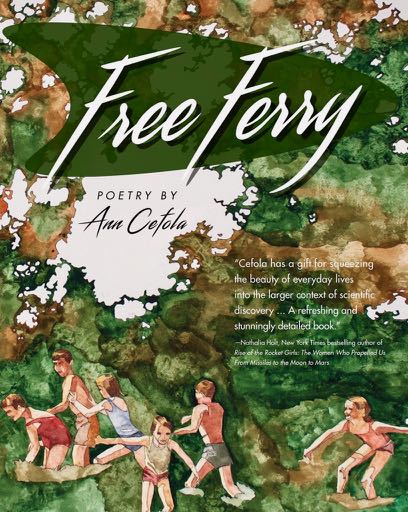Ann Cefola, Free Ferry
reviewed by Alison McBain

Free Ferry Publisher: Upper Hand Press LLC Date: April 7, 2017 Length: 68 pages ISBN: 0996439579; 9780996439572 |
The worlds painted between its pages show ladies who always wear skirts and bright red lipstick, and men who are war veterans. The nostalgia for this bygone era is explored via various themes, including passages focused on servicemen, housewives, scientific advancement, food, weather, nature, and childhood-tinted memories, among others.
These ideas are incorporated within classic Greek mythology, and the main reoccurring characters are Eurydice and Orpheus. For readers not familiar with these two figures, Eurydice was the daughter of a god and married Orpheus, a magical singer. When she was bitten by a viper and died, Orpheus went to the Underworld to retrieve her. He played so beautifully that Hades allowed Eurydice to return with him to the world of men. The one condition was Orpheus couldn’t look back at Eurydice walking behind him. If he did glance back on the journey out of the Underworld, Eurydice would be taken back, and he would only see her again after his own death. But Orpheus doubted she was behind him, she was so quiet, and he looked back. Eurydice returned to the Underworld, and Orpheus came back to earth alone.
In Free Ferry, Eurydice stands in for the narrator’s mother, and many of the poems focus on what she thinks and what is happening to her. Sometimes these events seem like memories of actual happenings, and sometimes they are flights of fancy. As in myth, Orpheus is Eurydice’s husband and a musician.
Others from Greek mythology appear also: there is Demeter, Eurydice’s mother in the poems, and Eros, who tries to lead her astray. Although Eurydice is the narrator’s mother, sometimes it seems as if they are the same person, as if the narrator is picturing the scenes from her mother’s perspective. Sometimes the two are separate, with the “I” watching what is happening to her mother.
Some of the poems are free verse, but most of them are a combination of free verse, oblique rhyme, end rhymes and internal rhymes. The words take on a singing/sung quality, and I feel they can best be appreciated when read/heard out loud. I was lucky enough to first experience them this way, as I attended a poetry reading where Ms. Cefola was one of the speakers, and she was kind enough to speak with me afterwards about this collection and her poetry in general. Interested to learn more about Ms. Cefola’s poetry and writing process, I conducted an interview on my website, which can be found here.
Just as there is an oral element to Ms. Cefola’s poems, there is also a visual element. Most of the poems are short, rarely more than fifteen lines, and often twelve lines or shorter. The poems centering around family and community are at the top of the page, while those focused on scientific advancement are at the bottom of the page. Almost every page has one poem of each theme, so there is a large visual break between the family theme above and the science below. And each separate theme follows a narrative pattern throughout the entirety of the book, the upward poems following one storyline, the downward poems following a second.
And yet the poems are connected, the themes overlapping at opportune points throughout the book. For example, the poem “compline,” on page 29, speaks about dry grass in the backyard, and the scientific-themed poem at the bottom of the page takes place in a desert. These parallels are cleverly inserted throughout the text.
The themes vary but center mostly around family, love, domesticity and the past. Some of these themes are seen in a contradictory light from one poem to the next. One poem might seem to glorify domesticity, for example, while the next one pushes against its claustrophobic nature.
There are some common motifs, including doctors, cooking, singing and music, childhood, children, science, technological advancement, communication, women and their roles in relationships and families, education, shopping and the post-war era.
I thought this was a very wonderful work that combines a sense of world history with personal history, telling a complete story that places the reader firmly in a specific point in time from the past. Yet the themes are still relevant today, including how people overcome obstacles set in their path, and how there can be a dichotomy of stories that are interrelated in numerous ways. I really enjoyed reading Free Ferry, and I hope you will, also.
Copyright © 2017 by Alison McBain

